MH17 plane crash: Netherlands holds solemn ceremony for victims
- Published
"Nations united in grief": Annita McVeigh reports on the ceremony at Eindhoven
The Netherlands has received the first victims' bodies from crashed Malaysia Airlines flight MH17 in a solemn ceremony at Eindhoven air base.
Forty hearses left for the town of Hilversum where the formal identification process will begin.
The Netherlands is observing a national day of mourning for the 298 victims, most of whom were Dutch.
Ukrainian pro-Russian rebels have been widely accused of shooting down the plane on 17 July.
UK government sources say intelligence shows rebels deliberately tampered with evidence, moving bodies and placing parts from other planes in the debris.
Ukrainian PM Arseniy Yatseniuk claims one of its jets may have been downed by an air-to-air missile
As fighting continued in eastern Ukraine on Wednesday, officials in Kiev told the BBC that two aircraft, thought to be military jets, had been downed just 35km (20 miles) from the crash site.
Prime Minister Arseniy Yatseniuk later told the BBC that one of the fighters could have been hit by an air-to-air missile. He did not directly accuse Russia but said it was not brought down by a Ukrainian jet.

The hearses left Eindhoven air base in a cortege, passed flags at half mast
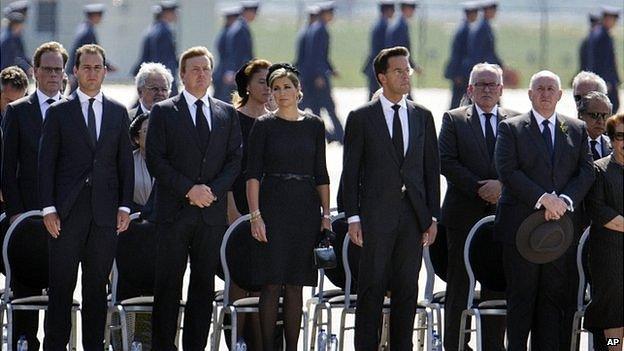
Members of the Dutch royal family and Prime Minister Mark Rutte watched the coffins leave the planes
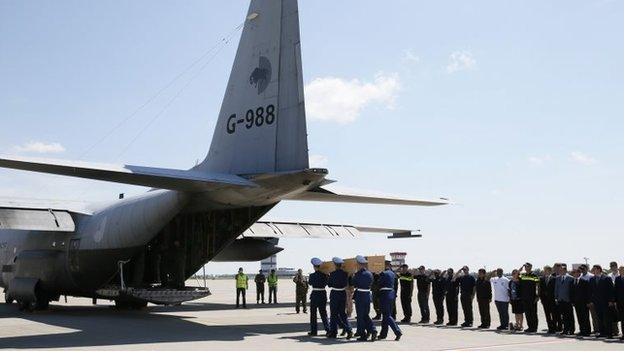
Earlier, honour guards had carried the coffins on to two planes at Kharkiv airport
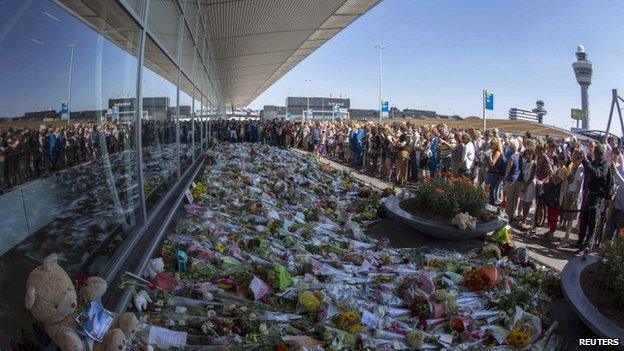
Many observing the day of mourning went to Schiphol Airport, where flight MH17 took off from, to lay flowers
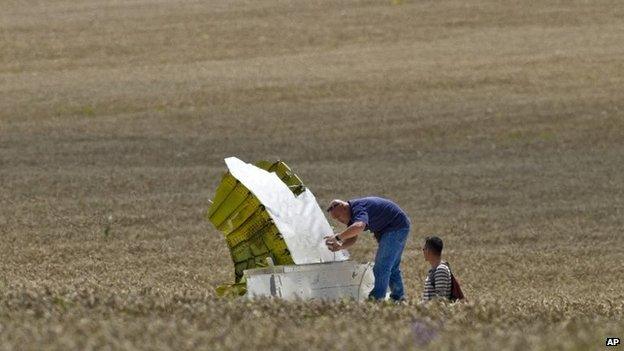
Teams of investigators from several countries are still at the crash site
Two military planes - one Dutch and the other Australian - carrying the first 40 coffins landed at Eindhoven air base on Wednesday afternoon. They were met by members of the Dutch royal family, Prime Minister Mark Rutte and hundreds of victims' relatives.
Churches around the Netherlands rang their bells for five minutes before the planes landed, and flags of all the nations affected by the disaster have been flying at half mast. There was also a minute's silence.
The coffins were slowly loaded into a fleet of waiting hearses which then moved off in motorcades.
A day of mourning is being held in the Netherlands, as Anna Holligan reports
All the bodies are being taken to the Korporaal van Oudheusden barracks south of the city of Hilversum for identification, a process that could take months.
Two more planes carrying victims are due to arrive in Eindhoven on Thursday.
Earlier, the coffins had been loaded on to the planes by a military guard of honour at Kharkiv airport in eastern Ukraine.
There has been mounting international anger at the delays in recovering the bodies.
Pro-Russian rebel leader Alexander Borodai denied neglecting bodies at the scene
However, separatist leader Alexander Borodai told BBC Newsnight that international observers from the Organization for Security and Co-operation in Europe (OSCE) had told them to leave the bodies to be collected by experts.
"So we wait a day. We wait a second day. A third day. Come on! Not a single expert. Well, to leave the bodies there any longer, in 30 degree heat, it's absurd. It's simply inhuman. It's a scene from a horror movie," he said.
OSCE spokesman Michael Bociurkiw denied they told rebels not to move the bodies. He told the BBC: "It is not consistent with our mandate to tell people what to do. We're here to monitor, observe and report."
Rebels have also been accused of exaggerating the number of bodies transported from the crash site to the town of Kharkiv on Tuesday.
They had claimed there were 282 bodies but experts said only 200 could be verified.
In a separate development, the Dutch air safety board said the cockpit voice recorder from flight MH17 had been successfully downloaded and contained "valid data from the flight".
The "black box" flight-data recorders are being examined at the headquarters of the UK's Air Accidents Investigation Branch in Farnborough.
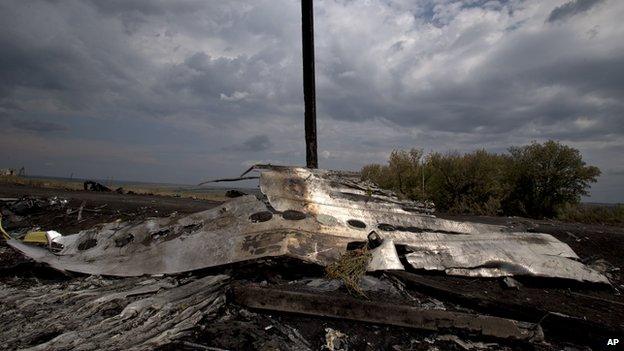
Experts have expressed concern that forensic evidence at the crash site could be lost
Earlier in Washington, intelligence officials presented evidence they had gathered on the involvement of the rebels.
"It's a solid case that it's an SA-11 [missile] that was fired from eastern Ukraine under conditions the Russians helped create," said the officials, who requested that their names not be reported.
They said the "most plausible explanation" was that rebels mistook the airliner for another aircraft.
The evidence they presented included:
Satellite images of a facility allegedly used to train rebels near the Russian city of Rostov, which were later tweeted, external by Geoffrey Pyatt, US ambassador to Ukraine
Other images purportedly showing a surface-to-air missile launcher in the area
Analysis of voice recordings of pro-Russian rebels apparently admitting bringing the airliner down
Photos and messages from social-media sites pointing to rebel involvement
Richard Galpin reports from Kharkiv airport as some of the victims' "long journey home" begins
BBC security correspondent Gordon Corera said some observers suggested the US statement constituted a subtle backing off from more assertive claims over the weekend in which they said they could not rule out a direct Russian role. American diplomats said this was not the case.
Meanwhile, fighting between Ukrainian government forces and rebels around the rebel stronghold of Donetsk has reportedly left 16 people dead.
A statement from overall military commander Igor Strelkov posted on a rebel website said he had withdrawn his fighters from the outskirts of Donetsk.
He said they had pulled back and were prepared to defend their positions.
The fighting in eastern Ukraine erupted in April and is believed to have claimed more than 1,000 lives.
